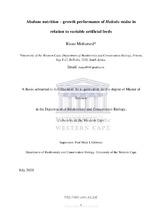| dc.contributor.advisor | Gibbons, Mark J. | |
| dc.contributor.author | Mohamed, Riaaz | |
| dc.date.accessioned | 2021-02-22T12:39:30Z | |
| dc.date.available | 2021-02-22T12:39:30Z | |
| dc.date.issued | 2020 | |
| dc.identifier.uri | http://hdl.handle.net/11394/7860 | |
| dc.description | Magister Scientiae (Biodiversity and Conservation Biology) - MSc (Biodiv and Cons Biol) | en_US |
| dc.description.abstract | Abalone are among the most expensive and sought-after seafood subjects. In South Africa, Haliotis midae is the only commercially significant abalone species and it has become increasingly sold on the global market. The importance of abalone as a mariculture subject has triggered extensive research into maximizing production, with particular emphasis on optimizing growth rates. This study aimed to assess the growth performance of Haliotis midae relative to 1) standard pelleted feed, and 2) kelp-inclusive pelleted feed. I assessed feed stability of the dietary treatments and growth parameters associated with abalone weight gain. Temperature and time of feed submersion were found to significantly affect feed stability. Although there were no significant differences in water stability between feeds, the kelp-inclusive feed produced significantly lower total suspended solids (TSS) than the standard pelleted feed at upper time-temperature combinations. | en_US |
| dc.language.iso | en | en_US |
| dc.publisher | University of Western Cape | en_US |
| dc.subject | Abalone | en_US |
| dc.subject | South Africa | en_US |
| dc.subject | Haliotis midae | en_US |
| dc.subject | Artificial feeds | en_US |
| dc.subject | Abalone nutrition | en_US |
| dc.title | Abalone nutrition – growth performance of Haliotis midae in relation to variable artificial feeds | en_US |
| dc.rights.holder | University of Western Cape | en_US |

